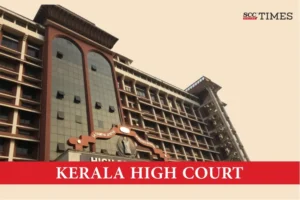Kerala High Court: In an appeal filed by accused under Section 14-A of the Scheduled Castes and the Scheduled Tribes (Prevention of Atrocities) Act, 1989 (‘SC/ST Act’), against the order passed by the Additional Sessions Court, which was dismissed, K. Babu, J. denied bail to the accused, acknowledging that while the court must respect the fundamental right to liberty of the accused under Article 21 of the Constitution, it also cannot overlook the atrocious nature of the offense committed.
It was alleged that the accused committed the offences punishable under Sections 376(2)(a)(f)(n), 376(3), 354, 354(A)(1)(i)(ii)(iii), 354(B), 354(D)(ii) and 363 of the Penal code, 1860 (‘IPC’), Sections 4(1) r/w Section (3)(a)(c), 6(1) r/w Section 5(a)(ii)(iii)(iv), 5(l)(k)(p), 10 r/w Section 9(a)(ii)(iii)(iv), 9(c)(l)(p), 12 r/w Section 11(iv) of the Protection of Children from Sexual Offences Act (‘POCSO Act’) and Section 3(2)(v) of the SC/ST Act.
The accused was not a member of a scheduled caste or scheduled tribe. The victim was a member of the scheduled caste. The accused was a police officer working as SPC Instructor. The victim was a 14-year-old student studying at GVHSS, Puthanchira. The accused was entrusted with the responsibility of training the students at the school in the SPC course. The accused seduced the victim by maintaining a relationship over mobile phone. By offering birthday treat, on 14-11-2022, he took her to a house near Cheraman mosque, Kodungallur, and committed assault on her.
The Court noted that the accused was arrested on 26-09-2024 and has been in judicial custody since then.
The Court said that the jurisdiction to grant bail has to be exercised on the basis of well-settled principles having regard to the facts and circumstances of each case.
The Court laid down the following factors to be taken into consideration while dealing with application for bail:
-
The nature of the accusation and the severity of the punishment in the case of conviction and the nature of the materials relied upon by the prosecution;
-
Reasonable apprehension of tampering with the witnesses or apprehension of threat to the complainant or the witnesses;
-
Reasonable possibility of securing the presence of the accused at the time of trial or the likelihood of his fleeing from justice;
-
Character, behaviour and standing of the accused and the circumstances which are peculiar to the accused;
-
Larger interest of the public or the State and similar other considerations.
The Court said that there is no hard and fast rule regarding granting or refusing bail. Each case has to be considered based on the relevant facts and circumstances and on its own merits. The discretion of the court has to be exercised judiciously and not in an arbitrary manner.
The Court emphasised that in serious offences, the courts should not lightly entertain the bail application when there is a prima facie case. Where the offence complained is of such nature as to shake the confidence of the public, bail shall not be granted.
The Court further added that while the court cannot ignore the fundamental right of the accused under Article 21 of the Constitution, it cannot shut its eyes totally to the atrocious nature of the offence committed. Ultimately, it is a question of harmonizing the two situations and finding the course to be adopted to see that justice is done to both parties.
After perusing the case diary and the report submitted by the Investigating Officer, the Court noted that the material placed by the prosecution would reveal that the accused is alleged to have committed heinous offences. The prosecution has established a prima facie case.
Therefore, the Court rejected the Bail application.
[Chandrasekharan v. State of Kerala, 2024 SCC OnLine Ker 6851, decided on 21-11-2024]

